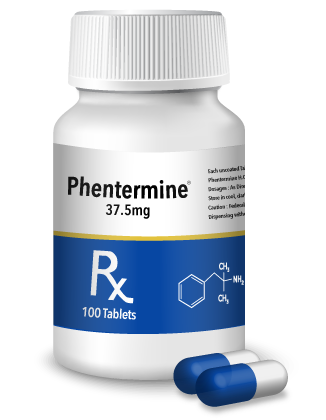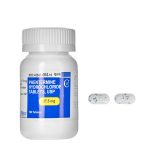How Much Weight Can You Lose While Taking Phentermine?

The U.S. adult obesity rate stands at 42.4 percent, the first time the national rate has passed the 40 percent mark, and further evidence of the country’s obesity crisis. The national adult obesity rate has increased by 26 percent since 2008. Being obese can also increase your risk of developing many potentially serious health conditions, including: type 2 diabetes, high blood pressure, high cholesterol and atherosclerosis (where fatty deposits narrow your arteries), which can lead to coronary heart disease and stroke.
Weight loss medications are an important component of a complete treatment plan for adults with obesity (BMI > 30) or overweight (BMI > 27) with increased adiposity complications. The benefits of weight loss medications include: appetite control, improvement of eating behavior, and slow progression of weight gain and regain.
Before 2012, there were few weight loss medications approved by the U.S. Food and Drug Administration (FDA). One of the top medications at that time was phentermine.
What is phentermine?
Phentermine is a weight loss prescription drug that comes as an oral capsule, an oral tablet, and an orally disintegrating tablet. Phentermine oral capsule is available as the brand-name drug Adipex-P and Axcion Fentermina. It’s also available as a generic drug. Generic drugs usually cost less than the brand-name version. In some cases, they may not be available in every strength or form as the brand-name drug.
Like other prescription weight-loss drugs, phentermine is intended to be used as part of an overall weight-loss plan. It is indicated for people who are obese, and who have failed to lose enough weight with diet and exercise alone — not for people who want to lose just a few pounds. Phentermine is a Schedule IV drug, a classification given to drugs that have a potential for abuse, although the actual potential appears to be low.
How does phentermine work?
Phentermine belongs to a class of drugs called anorectics. A class of drugs is a group of medications that work in a similar way. These drugs are often used to treat similar conditions.
It isn’t known exactly how phentermine works to help you lose weight. It may work by increasing the release of chemicals in your brain that help reduce your appetite. This may help you eat less, which would aid in weight loss.

How should I take phentermine?
Take phentermine exactly as prescribed by your doctor. Follow all directions on your prescription label and read all medication guides or instruction sheets. Your doctor may occasionally change your dose.
Doses are normally taken before breakfast, or 1 to 2 hours after breakfast. Follow your doctor’s dosing instructions very carefully.
Never use phentermine in larger amounts, or for longer than prescribed. Taking more of this medication will not make it more effective and can cause serious, life-threatening side effects.
This medicine is for short-term use only. The effects of appetite suppression may wear off after a few weeks.
Phentermine may be habit-forming. Misuse can cause addiction, overdose, or death. Selling or giving away this medicine is against the law.
Call your doctor at once if you think this medicine is not working as well, or if you have not lost at least 4 pounds within 4 weeks.
Do not stop using this medicine suddenly, or you could have unpleasant withdrawal symptoms. Ask your doctor how to safely stop using this medicine.
How much weight can you lose with phentermine?
Several clinical studies have proven that phentermine can boost fat loss. The expected average weight loss with phentermine use is 5% of your initial body weight. Yet, over 12 weeks, it can be as high as 10%. This equates to a weight loss of 10–20 pounds (4.5–9 kg) for a 200 pound (90.7 kg) person.
In addition, a meta-analysis of six studies involving people who took the average dose of 27.5 mg of phentermine for 13 weeks indicates that they lost an average of 13.9 pounds (6.3 kg) compared to 6.2 pounds (2.8 kg) in placebo groups.
What are the side effects of phentermine?
Common side effects of phentermine include:
- Increased heart rate
- Tingling or prickling feeling in hands or feet
- Dry mouth
- Sleeplessness
- Nervousness
- Constipation
Although phentermine is one of the most commonly prescribed weight-loss medications, it isn’t a good option if you have heart disease, high blood pressure, an overactive thyroid gland or glaucoma. It is not recommended for women who are pregnant, may become pregnant or are breast-feeding.





